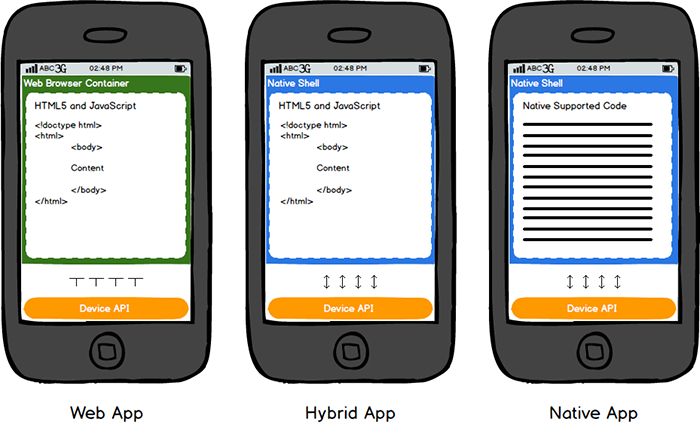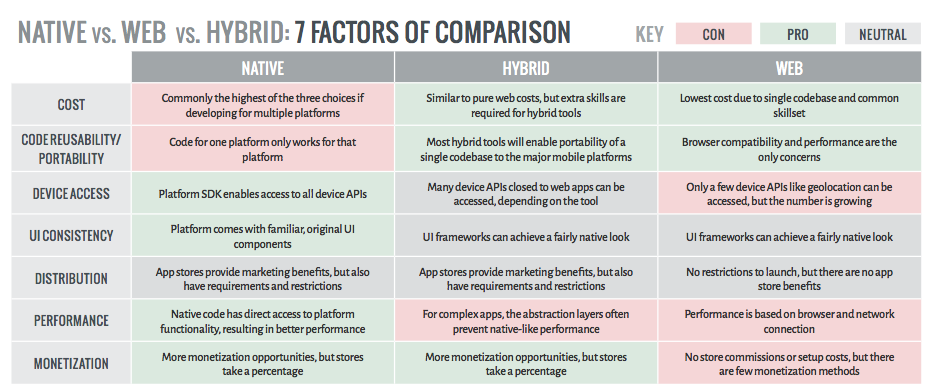Are you planning to develop a Mobile App for your business and not sure whether to choose a Native or Hybrid Mobile App? Take a look at the pros/cons of each approach listed below and decide accordingly.
Smartphone Apps have become indispensable for any business to improve the user experience of their customers, to promote their products and to increase revenue. There are different approaches in developing a Mobile App and such as Native and Hybrid Mobile Apps. As a business owner, you should clearly understand the differences as well as the pros/cons of each technique before you invest in spending a Mobile App for your business.
Native Mobile Apps are developed to be compatible only for a specific Mobile operating system and cannot be installed in Smart phones running a different OS. For example, a Native mobile App developed using Swift or Objective-C for iOS can be installed only in iPhones and will not be compatible for Android phones which are based on Java. Since they are developed using the compatible technology for specific operating system, they are more powerful and ensure faster performance. Native Apps can easily access the built-in features of your Smart phone such as Camera, GPS, Contacts, Messaging service etc. Hence Native Apps give more control and flexibility when compared to Hybrid Apps. Instagram and Android Music player are perfect examples of Native Apps.
Hybrid Mobile Apps on the other hand are actually company’s website which gets packaged into the mobile platform using Native wrapper. Hybrid Mobile Apps are built using JavaScript and HTML5 and are wrapped in a java container which will load the contents dynamically while user navigates through the App. But Native Apps will download most of the information during the installation process itself. Some of the common examples of Hybrid Apps are Facebook App and Financial Times News App.

Advantages and Limitations of Native Apps:
- Absolutely user-friendly and loads much faster than Hybrid Apps.
- Can be easily found in App stores like Apple iTunes store or Android Google Play.
- Can access all the phone’s internal features like Camera, GPS, Gallery, Phonebook, Calendar etc.
- They can be used in Offline mode as well and don’t require internet access always.
- But they are expensive to develop and require much technical expertise about the mobile platform. Also it takes lot of time and effort to develop a Native Mobile App.
- You can send push notifications to users in Native Mobile Apps.
- They guarantee high levels of security, smoother user experience and faster performance.
Advantages and Limitations of Hybrid Apps:
- The main advantage of Hybrid Mobile Apps is that they are portable and one code base is compatible with multiple mobile platforms.
- Through plug-ins they can access various device hardware like GPS, camera etc.
- They are less expensive to develop when compared to Native Mobile Apps. Also the time to market is faster and they can be developed easily.
- Does not require any API development since all the features are handled through Web.
- They can be used only when you are Online and depend on Mobile data to load certain features of the App.
- You can’t access the Phonebook directly and won’t be able to send push notifications to users with Hybrid App.

How to choose between Native and Hybrid Mobile App for your Business?
If you are a business owner and looking to develop a mobile App for your business, you should choose the correct approach based on your requirements and budget. Since Native Apps are much costlier and takes lot of time to develop, you should go for it only if you have very high performance requirements. Also the minimum budget required for developing a Native mobile App can range from $50k and can go as high as $1 million depending on the complexity of your App and required features. If you are ready to offer such high budgets and can wait for at least 6 months, then you can go ahead with Native Mobile Apps. Also Native Apps have high maintenance costs which you should take into account before planning your budget.
On the other hybrid mobile Apps are much cheaper to develop and can be won’t require much time. If you want a customer-focused App where graphics, performance and security are very important, you should choose Native Mobile App for your business. Typically Games are developed as Native Apps as they require faster performance and improved user experience.
So, based on your business requirements, target customers, time to market and budget you can choose to go for either Native or Hybrid Mobile App for your business.

